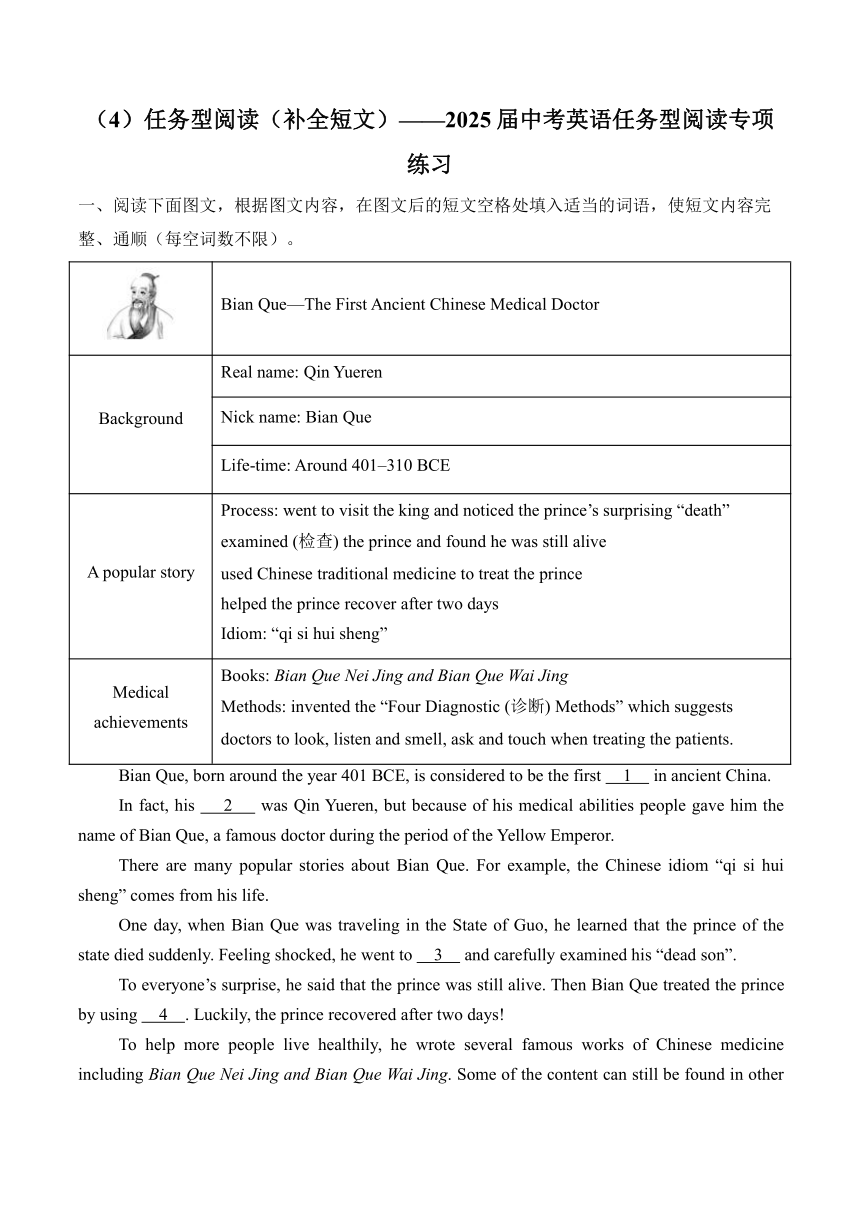
(4)任务型阅读(补全短文)———2025届中考英语任务型阅读专项练习 一、阅读下面图文,根据图文内容,在图文后的短文空格处填入适当的词语,使短文内容完整、通顺(每空词数不限)。 Bian Que—The First Ancient Chinese Medical Doctor Background Real name: Qin Yueren Nick name: Bian Que Life-time: Around 401–310 BCE A popular story Process: went to visit the king and noticed the prince’s surprising “death” examined (检查) the prince and found he was still alive used Chinese traditional medicine to treat the prince helped the prince recover after two days Idiom: “qi si hui sheng” Medical achievements Books: Bian Que Nei Jing and Bian Que Wai Jing Methods: invented the “Four Diagnostic (诊断) Methods” which suggests doctors to look, listen and smell, ask and touch when treating the patients. Bian Que, born around the year 401 BCE, is considered to be the first 1 in ancient China. In fact, his 2 was Qin Yueren, but because of his medical abilities people gave him the name of Bian Que, a famous doctor during the period of the Yellow Emperor. There are many popular stories about Bian Que. For example, the Chinese idiom “qi si hui sheng” comes from his life. One day, when Bian Que was traveling in the State of Guo, he learned that the prince of the state died suddenly. Feeling shocked, he went to 3 and carefully examined his “dead son”. To everyone’s surprise, he said that the prince was still alive. Then Bian Que treated the prince by using 4 . Luckily, the prince recovered after two days! To help more people live healthily, he wrote several famous works of Chinese medicine including Bian Que Nei Jing and Bian Que Wai Jing. Some of the content can still be found in other works later. He also invented the “Four Diagnostic Methods” which suggest doctors to look, listen and smell, ask and touch when treating the patients. In my opinion, Bian Que is a(n) 5 Chinese doctor. 二、请阅读下面短文,根据语篇内容,在方框内的缩写文章中,填入与短文意思最符合的单词。每空一词。 Four months ago I had the chance to stand for China on the stage of the International Public Speaking Competition (IPSC). My biggest and hardest challenge seemed to be the audience (观众). They did not share the same culture as we do, and they might have had different ideas and expectations. So what would they want to hear on an international stage I thought they want to hear the topics that are common in the world, which means that they would expect us to connect our culture with theirs to solve problems that we have. We often hear that the young has the responsibility to tell Chinese stories to the world. When I started to prepare for that speech, I kept asking myself questions: What Chinese wisdom (智慧) can we bring to the world What stories do I want the world to know Finally, I decided to share my ideas on the choices about the finals (决赛). I provided a creative pattern of child-caring. It showed the difference on the same thing between parents and children and how family deal with ... ...
~~ 您好,已阅读到文档的结尾了 ~~

